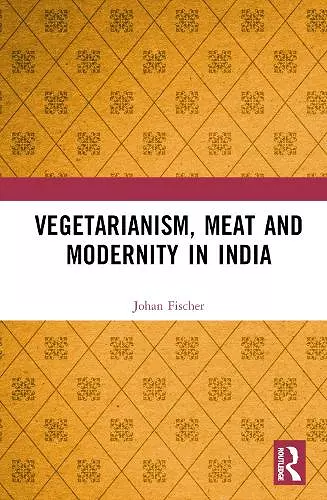Vegetarianism, Meat and Modernity in India
Format:Hardback
Publisher:Taylor & Francis Ltd
Published:7th Apr '23
Currently unavailable, and unfortunately no date known when it will be back
This hardback is available in another edition too:
- Paperback£39.99(9781032334844)

Never before in human history have vegetarianism and a plant-based economy been so closely associated with sustainability and the promise of tackling climate change. Nowhere is this phenomenon more visible than in India, which is home to the largest number of vegetarians globally and where vegetarianism is intrinsic to Hinduism. India is often considered a global model for vegetarianism.
However, in this book, which is the outcome of eight months of fieldwork conducted among vegetarian and non-vegetarian producers, traders, regulators and consumers, I show that the reality in India is quite different, with large sections of communities being meat-eaters. In 2011, vegetarian/veg/green and nonvegetarian/ non-veg/brown labels on all packaged foods/drinks were introduced in India. Paradoxically, this grand scheme was implemented at a time when meat and non-vegetarian food production, trade and consumption were booming. The overarching argument of the book is that a systematic study of the complex and changing relationship between vegetarian and non-vegetarian understandings and practices illuminates broader transformations and challenges that relate to markets, the state, religion, politics and identities in India and beyond.
The book’s empirical focus is on the changing relationship between vegetarian/ non-vegetarian as understood, practised and contested in middle-class India, while remaining attentive to the vegetarian/non-vegetarian modernities that are at the forefront of global sustainability debates. Through the application of this approach, the book provides a novel theory of human values and markets in a global middle-class perspective.
'Dietary shifts away from meat are seen to align with improvements in agricultural sustainability, climate change-related emissions reductions, human health, and wellbeing of animals. In the Indian case they also represent a cultural fusion of nationalism with religion. Read Fischer’s systematic and careful study for deeper insights into what makes for diet transformations. This enduring contribution brilliantly highlights the structures and drivers that yield dietary persistence vs. change, with a direct focus on vegetarianism in India.' - Arun Agrawal, Professor, School for Environment and Sustainability, University of Michigan.
'Written by a seasoned ethnographer of religion and markets, this is a multi-sited and multi-scaled dissection of cosmopolitan middle-class food culture in Hyderabad and of the production-distribution-regulation system through which it’s provisioned. Fischer offers a carefully grounded social analysis of many paradoxes and contradictions in the world’s leading vegetarian nation. Both vegetarianism and meat-eating are festooned in scientised claims about health and nutrition but both communicate enduring social meanings and dietary norms. This should be essential reading for anyone interested in human values and markets, especially for food.' - Barbara Harriss-White, FAcSS, Emeritus Professor and Fellow, Wolfson College, Oxford University.
'In this important book Fischer shows the political significance of controversies around vegetarianism and meat consumption in India. The Hindu nationalist myth that India is a vegetarian civilization is belied by the increasing popularity of meat, especially among middle classes. In his ethnography Fischer focuses on the contradictory realities of Hyderabad in South India. A must read for anyone interested in the politics of vegetarianism in India.' - Peter van der Veer,Emeritus Director of the Max Planck Institute for the Study of Religious and Ethnic Diversity.
' … there is much to be learnt from Vegetarianism, Meat and Modernity in India about the actors and processes that shape India’s fast-changing food ways in contradictory ways, and with global ramifications.' - Kenneth Bo Nielsen, Journal of Contemporary Asia
ISBN: 9781032334837
Dimensions: unknown
Weight: 453g
168 pages